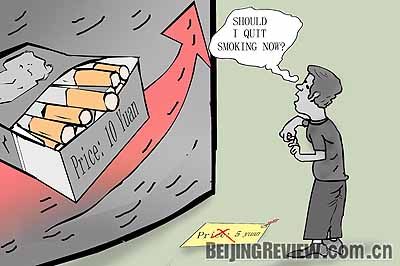|

Experts from China's State Administration of Taxation and the University of California, Berkeley unveiled a report, "Tobacco Tax and Its Potential Impact on China," in Beijing last December. In the report, they called for a substantial increase in the cigarette tax rate in order to reduce cigarette consumption in China.
According to the experts, if China's cigarette tax rate was raised to 51 percent of the retail price, an increase of 11 percentage points from the current level, 13.7 million smokers would therefore quit smoking and 3.4 million lives would be saved. The tax rate increase could also generate 64.9 billion yuan ($9.5 billion) in additional revenue for the government every year.
Internationally, the average cigarette tax rate is 65-70 percent of the retail price, according to the report.
Some people, however, believe that higher taxes will only help to promote sales of low-quality, cheap cigarettes, which will do more harm to smokers' health. They say that a tax rate increase is not the fundamental way to tackle the smoking problem.
However, according to a survey by the World Bank, each 10 percent in price increase will cut 4 percent of cigarette consumption in developed countries, while in developing countries it will drop by 8 percent.
New York City's success in tobacco control by raising cigarette taxes is an example of what can be achieved. After the local government launched a comprehensive anti-smoking effort in 2002 with the focus on raising the cigarette tax rate, the city's smoking rate declined by 20 percent in four years to 17.5 percent in 2006. A survey shows that 45.3 percent of New York smokers are smoking less than before or are considering quitting smoking due to the rising cigarette tax. It was also found that low-income earners tended to reduce smoking more than high-income earners did against cigarette price hikes. The rise in tax also greatly cut the number of adolescent smokers who are more sensitive to cigarette prices because of their limited finances.
Follow the money
Li Qiang (www.iqilu.com): There has long been an economic misreading of tobacco addiction: Nicotine in tobacco makes smokers addicted to cigarettes, so price increases will never cut sales of cigarettes. However, evidences around the world in the past century prove that this is a false judgment. Almost in every country, once tobacco prices are raised, consumption will fall.
Statistics show that this is also the case in China. According to studies by Professor Mao Zhengzhong from the West China University of Medical Sciences, a 10-percent increase in tobacco prices will reduce 1.5 percent of cigarette consumption. This is not a small figure in China. Every year, Chinese smokers consume 170 billion cigarettes and thus 1.5 percent means 2.55 billion cigarettes. This might be the total cigarette consumption in some other countries in a year.
Besides, it is not that cigarette addiction cannot be stopped. Although some smokers say they will continue to smoke despite price increases, many more tend to quit their smoking habit. From the perspective of public health, as long as they have impacts on some smokers, tax increases actually play an effective role in the anti-smoking campaign.
Some people argue that raising tobacco taxes is unfair to low-income smokers because they have to spend more of their limited income on cigarettes. This is illogical. First, tobacco taxes are not the source of poverty, but the habit of smoking is an important factor contributing to poverty. In some of China's low-income families, expenditures on cigarettes can account for 7-10 percent of their total income. If the smoking members abandon this habit, this part of their income can be spent on education, health and food, which will help to relieve poverty. Second, low-income smokers tend to be more sensitive to cigarette prices and so raising cigarette taxes will affect them greatly. Therefore, low-income smokers are more likely to reduce and even abandon smoking, causing less diseases and fatalities and thus reducing expenditures on health care. In this sense, higher tobacco taxes have more benefits to low-income earners than harm.
Ai Caiqin (National Business Daily): It's obvious that China needs to reduce its tobacco consumption. The country now has 350 million smokers and smoking-related diseases kill 1 million people every year. If the country does not implement effective tobacco control programs, this number is expected to rise to 2 million in 2020.
Actually, there are many successful examples of higher cigarette taxes helping to curb smoking. In the United States, after cigarette taxes were raised by 10 percent, adolescent smokers dropped by 9.7 percent to 12 percent. In Britain and Canada, higher cigarette taxes have also contributed a lot to tobacco control.
Higher cigarette taxes will help to prevent more potential smokers from lighting up. At the same time, paying more for a pack of cigarettes may discourage them from smoking.
Xin Haiguang (The First): China has a large number of smokers, and the long history of smoking in this country makes it difficult to carry out tobacco control programs. As a result, any move that might affect the tobacco industry's interests will be resisted. Today, realistically, as long as a move is able to help to reduce tobacco consumption, even if it's only a slight help, it deserves support. Small initiatives are better than no action at all.
| 